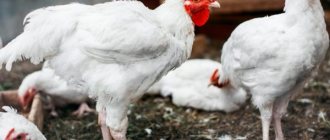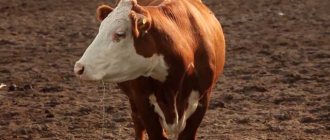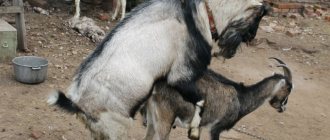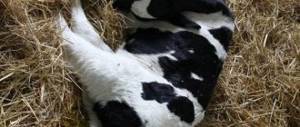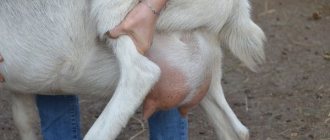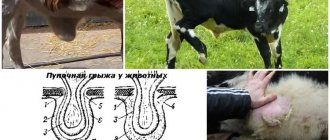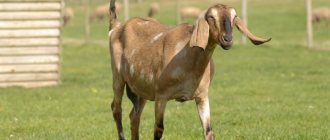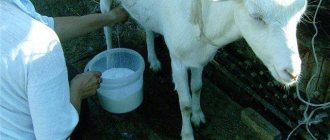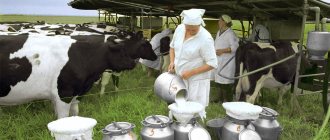Reasons for appearance
First, let's look at the causes of this disease in adult goats and kids.
In adults
There are the following common causes of diarrhea in adults:
- consumption of low-quality food (affected by fungus and mold);
- dirty and stale water;
- poisonous grass that accidentally got into the feed;
- poisoning;
- an excess of cake with gossypol in the feed, which tends to accumulate in the body because it is slowly eliminated from it;
- excess succulent feed (beets, potatoes);
- deficiency of vitamins in the goat’s body;
- poor living conditions (dirt, dampness);
- a sharp change in the animal’s diet;
- cold;
- binge eating;
- congenital pathology of the stomach;
- an infectious disease accompanied by diarrhea;
- parasites in the intestines of animals.
Diarrhea in adults may appear immediately after lambing. The reason for this is the excessive care of the owners, who strive to feed the young mother well.
In goat kids
Diarrhea in a kid appears for the following reasons:
- if he was kept in a damp and dark room immediately after birth;
- when the mother goat was poorly fed in the last third of pregnancy;
- if the baby is overfed;
- when there are parasites in the goat’s body;
- as a result of feeding cold milk or colostrum;
- with a sudden change in diet;
- goats can become infected from their mother, so a pregnant goat must be carefully cared for.
Did you know? The appearance of diarrhea after lambing can be predicted by observing the behavior of the goat.
If she licks her baby for a very long time, the animal should have diarrhea.
Possible causes of diarrhea in young animals
The digestive tract of young goats, unfortunately, does not have the same stable functioning as that of adult goats. Therefore, loose stools occur in babies much more often than in mature animals. The causes of diarrhea in young animals are:
- unbalanced diet;
- infectious diseases;
- parasites;
- overfeeding;
- a sharp change in the usual diet.
Depending on the cause that activated the infection of young animals, diarrhea is divided into infectious and non-infectious, which differ in symptoms:
- Infectious diarrhea is accompanied by watery bowel movements. The feces may be covered with foam, have an unusual color or foreign secretions - blood, mucus. The kid has no appetite, the pet feels unwell and is motionless. In some cases, there may be an increase in body temperature and abdominal pain upon palpation.
- Non-infectious diarrhea in kids is characterized by loose stools of normal color without foreign secretions. The pet remains in its normal state and does not refuse food.
Even if non-infectious diarrhea is detected, it is worth paying attention to the kid, since the young, fragile organism is especially vulnerable at this time. Since young goats are most susceptible to disorders, experienced farmers advise introducing a decoction of oak bark into the diet of young animals as a preventive measure. The recipe for the product is simple: brew one tablespoon of crushed bark in 400 ml of boiling water and leave for a couple of hours. The finished infusion is filtered and given 50 ml twice a day.
How can diarrhea be dangerous?
Diarrhea is very dangerous for both adult goats and their babies in particular, because as a result the animals’ bodies are dehydrated and the intestinal microflora is disrupted. This is a serious test for the body, which can be fatal if the necessary treatment measures are not taken in time. Due to diarrhea, the water balance in the goat's body is disturbed. As a result, the amount of milk decreases significantly.
In addition, pathogenic bacteria get into the milk, especially if diarrhea occurs as a result of any infection. This milk is not recommended for human consumption. It is best to boil it and make cottage cheese out of it. You can drink milk only after the goat has fully recovered.
In addition, diarrhea may indicate the following dangerous diseases:
- foot and mouth disease - this disease affects the nipples, udder, and oral mucosa;
- listeriosis - the animal loses its appetite, its body temperature rises, and coordination of movements worsens;
- pasteurellosis - the respiratory system, intestines and other organs are affected.
If first aid measures do not help, immediately call a veterinarian so that he can diagnose the exact source of diarrhea and prescribe emergency treatment.
Did you know? Goat's milk, unlike cow's milk, does not cause allergies in the human body. In addition, it is very good for health, as it restores the functioning of the intestines and its microflora, as well as the hormonal balance of the body. To get the daily amount of vitamins the body needs, it is enough to drink just one glass of milk a day.
How to notice diarrhea in time?
In the warm season, goats spend most of their time on pastures, and the initial stage of diarrhea may go unnoticed by the owner (especially if loose stools are not caused by very serious reasons, and the process itself is sluggish).
However, an experienced goat breeder will immediately notice even such sluggish diarrhea by the following signs:
| № | Helpful information |
| 1 | the animal's butt is constantly soiled with feces |
| 2 | the weight of the animal, although not by much, has decreased |
| 3 | After eating, goats bleat more often and louder than usual |
When kept in stalls, diarrhea is easier to notice. When cleaning the premises regularly, the owner will immediately notice that the bedding of sick animals is damper and dirtier than that of healthy animals.
If diarrhea is caused by a serious illness or viral infection, then more pronounced symptoms will indicate this (both in young and adult individuals):
- the animal suddenly loses weight;
- refuses food;
- the color of the feces changes, becoming bright green, red or yellow;
- possible foaming of stool;
- the animal tries to move less;
- the amount of milk produced decreases;
- body temperature rises;
- the animal is breathing frequently and heavily.
More on the topic: What should a goat feeder be like?
First aid
If your animal develops diarrhea, you need to move it to a separate room to prevent infection of the entire herd, since intestinal distress is often caused by an infectious disease. After this, the goat is not fed for 8–10 hours.
Instead, every 3-4 hours she is given warmed saline (200-250 ml each) or a decoction of oak bark, bird cherry, or starch solution. You can give your goat a couple of tablespoons of castor oil. In between this, you can give the animal to drink milk so that its body is saturated. This first aid should also be provided to kids, excluding castor oil from treatment.
Treatment of diarrhea using traditional methods
Everything is clear with drug treatment, but how to treat diarrhea in kids with folk recipes?
When fighting diarrhea in the initial stages, you can use:
- A decoction of oak bark, which is added to warm milk and given to the animal several times a day in small quantities. If diarrhea has acquired a more complex form, then the decoction is given without milk.
- Bird cherry infusion, for the preparation of which you take fresh flowers, infuse in boiling water and give in small quantities.
- If you find diarrhea in goats, how can you treat it? Rice decoction is another very effective traditional medicine. To prepare it, rice is cooked until tender, after which the strained water is given to the kid instead of water.
There are many other folk remedies that are effective for diarrhea in farm animals. Therefore, they can also be used to combat this disease.
What to do and how to treat diarrhea at home
It is quite possible to cure diarrhea at home. Let's discuss methods of such treatment further.
Important! The room from which you took the sick animal must be disinfected to eliminate the source of infection.
Pharmacy drugs
Recommended reading
What can you call a goat: the best nicknames
of Rivanol or a 0.1% solution of Furazolidone is very effective for adult goats But the best antibiotics are Levomycetin, Biomycin, Tylosin and Verakol.
The dosage of these drugs is determined by the veterinarian depending on the complexity of the disease.
Goat kids can also be treated with pharmaceutical remedies if folk remedies do not help. Give them antibiotics “Fthalazol” or “Sulcin” (0.2 g per 1 kg of live weight).
Folk remedies
Treatment of diarrhea in a goat can be carried out using a decoction of oak bark. It is prepared like this:
- Take a tablespoon of crushed bark, place it in an enamel container and pour a glass of hot boiled water.
- Leave the mixture for half an hour in a water bath to infuse.
- The product is ready when its color becomes almost black or dark brown.
- The mixture must be strained, the grounds squeezed out and poured with boiling water until the volume of the decoction reaches 300 ml.
This remedy is given to the goat to drink three times a day.
Video: How to treat diarrhea in a goat
Rice water helps with diarrhea. You can prepare it like this:
- Rinse a glass of rice. Soak it for 10 hours.
- Pour it with a liter of water, add a little salt and cook for about an hour over low heat.
- Strain the mixture, add 50 g of sugar to the water and bring it to a boil.
- The animal should be given 1/4 cup of this decoction every 2 hours.
Frequent enemas with activated carbon dissolved in warm water also help get rid of the disease. For the treatment of diarrhea in children, in addition to the remedies described above, a decoction of chamomile is well suited. It is prepared in the same way as a decoction of oak bark. Chamomile has a beneficial effect on the intestines and eliminates irritation.
Important! If the diarrhea does not stop after using all the remedies described above, call your veterinarian.
He will give an intramuscular injection of antibiotics.
Causes of diarrhea in goats and kids
Most often, goats suffer from diarrhea. Their digestive tract has not yet adapted to living conditions, so even insignificant pathogens provoke a malfunction of the stomach and intestines. Adult goats already have immunity against common infections, but kids have not yet developed it.
But even an adult goat can experience diarrhea. The disease becomes inevitable when the owner feeds the animal low-quality, moldy food and does not vaccinate in a timely manner. Diarrhea is often observed in pregnant and postpartum goats, which is associated with exhaustion of the body and a weakened immune system.
Improper feeding
Although goats are not capricious in their diet, poor quality food is the most common cause of diarrhea. Moreover, diarrhea can be both an independent pathology and a symptom of a malfunction of the digestive organs. Diarrhea in kids and adults occurs due to:
- mold and rotting food;
- the presence of dirt and debris in the feed;
- traces of agricultural pesticides in forage grass;
- penetration of disinfectants and other household toxins into food;
- the presence of poisonous herbs in the pasture;
- sharp autumn and spring changes in diet;
- excess silage and other succulent feed with high acidity in the diet;
- insufficient inclusion of hay in the diet.
Inflammation of the gastrointestinal tract
Kids can diarrhea if gastritis, colitis, enteritis and other non-infectious inflammatory pathologies of the digestive tract occur.
These diseases occur due to:
- poor quality nutrition;
- the presence in the diet of foods that cause fermentation in the digestive tract;
- high percentage of silage in the diet;
- sudden change in diet;
- premature transfer of kids to adult food;
- feeding goat kids with milk from a goat suffering from mastitis;
- exposure to stress factors;
- sunstroke, overheating of the body;
- retinol (vitamin A) deficiency;
- drinking dirty and cold water.
In sick kids and goats, the appetite decreases, or even disappears altogether. Diarrhea periodically gives way to constipation. The feces look like cow pats with blood clots, mucus clots, and food particles.
Non-infectious inflammatory pathologies are not accompanied by fever. Body temperature is slightly increased, sometimes even slightly below normal.
Infectious diseases
Diarrhea in kids can be accompanied by dangerous infectious pathologies listed in the table.
See also
Causes and symptoms of ketosis in goats, diagnosis and treatment and preventionRead
| Disease | Flow form | Symptoms |
| colibacillosis | septic | body temperature 41-42 °C, rapid and shallow breathing, redness of mucous tissues, grinding of teeth, foaming at the mouth, convulsions and paralysis |
| enteritic | feces with blisters, mucus and blood, reddish urine | |
| pasteurellosis | lightning fast | trembling, falling to the ground, death in a few minutes |
| acute | lethargy, weak appetite, temperature 41-42 °C, mucous and purulent discharge from the nose, cough, convulsions, death after 3-5 days | |
| subacute | rhinitis, pneumonia, swelling of the chin and neck, after 2-3 weeks it may become chronic | |
| chronic | anemia, exhaustion, inflammation of the joints of the extremities | |
| salmonellosis | acute | lethargy, temperature about 41 °C, rapid breathing, tachycardia, weak appetite, blood streaks and white lumps in feces, death occurs after 3-5 days |
| subacute | lack of appetite |
Worms and parasites in goats
Baby goats infected with helminths and protozoan parasites are vilified. Infection occurs nutritionally: infected individuals defecate in feces containing microorganisms, and healthy goats eat food that has become infected with a parasite.
Expert opinion
Zarechny Maxim Valerievich
Agronomist with 12 years of experience. Our best country expert.
Ask a Question
For adult animals, helminths do not pose a great danger; only periodic digestive disorders with a decrease in milk production are possible. But infected goats are at risk of severe malnutrition.
The table shows common helminths that affect goats and kids.
| Parasitic disease | Provoking parasites | Localization and features of the lesion |
| moniesiosis | tapeworm up to 8 m | the source of infection is grass, the parasite lives in the intestines |
| alveococcosis | larvae that cause jaundice | affect the liver |
| fascioliasis | flatworms that cause jaundice | live in the bile ducts, diarrhea is dark in color due to the presence of bilirubin |
| paramphistomatosis | helminth larvae, the main host of which is mollusks | source of infection is grass; adult helminths infect the stomach and duodenum |
| dictyocaulosis | roundworm up to 15 cm | adult helminths inhabit the lungs, larvae migrate to the intestines |
| strongyloidiasis | thread nematode | lives in the intestines |
Care and feeding of goats during illness
During illness, make sure that the animal does not come into contact with other pets. Keep the room dry, clean and warm. Make sure the litter is thick and soft. Change it regularly. Avoid drafts and dampness. Constantly monitor how often the animal defecates.
Treatment with decoctions will protect the goat’s body from dehydration. After the “starvation diet” time has passed, you need to start feeding the goat a little with scattered oatmeal or fresh hay. You should not give the animal heavy food: cake, meal, grain dirt and clover. Young animals must be fed milk half diluted with water.
Important! Most often, the animal feels better on the second day. On the third day, the diarrhea should stop. If this does not happen, seek help from a veterinarian.
Nursing
When treating a sick animal, be sure to monitor the frequency of bowel movements during a starvation diet.
It is necessary for the goat to consume decoctions.
This will prevent dehydration of the body. It is permissible to give castor oil or bird cherry to adult animals.
After a period of fasting, a sick goat should be fed with oatmeal. Sources of fiber in the form of quality hay will also be needed.
You should not give cake, clover or rubbish. Goats should be given milk mixed in equal proportions with water.
However, if after two days of such help the animal does not feel better, you should definitely contact a specialist.
An intramuscular injection may be required. The results from using antibiotics are usually noticeable after three days.
Prevention measures
To avoid diarrhea in your patients, it is necessary to carry out the following preventive measures:
- Follow sanitary and hygienic rules for the care and maintenance of goats.
- Feed them quality food.
- Give animals fresh and clean water.
- When lambing, follow the rules of hygiene.
- Do not overfeed goats.
- Avoid large amounts of heavy food.
- Vaccinate against infectious diseases.
Diarrhea in goats is a dangerous disease that can signal the presence of other serious diseases. To prevent its occurrence, take preventive measures, and if you notice the first signs of the disease, do not delay treatment for your patients.
Prevention of diarrhea during antibiotic therapy
To prevent diarrhea while taking antibiotics, it is important to follow several recommendations:
- strictly adhere to the dosage and treatment regimen prescribed by the doctor;
- use probiotics recommended by a specialist;
- follow a diet to prevent gastrointestinal disorders;
- maintain optimal drinking regime;
- take medications that protect the lining of the stomach and the entire digestive tract. If you have chronic ailments, you must inform your doctor about them so that he can select an individual scheme for protecting the digestive system from the effects of antibiotics.
If it is necessary to take antibiotics, it is important to take into account the body's previous reactions to antibacterial therapy. Thus, in some patients, antibiotic-associated diarrhea develops in response to exposure to a particular group of drugs or a specific agent.
Treatment of diarrhea using traditional methods
Everything is clear with drug treatment, but how to treat diarrhea in kids with folk recipes?
When fighting diarrhea in the initial stages, you can use:
- A decoction of oak bark, which is added to warm milk and given to the animal several times a day in small quantities. If diarrhea has acquired a more complex form, then the decoction is given without milk.
- Bird cherry infusion, for the preparation of which you take fresh flowers, infuse in boiling water and give in small quantities.
- If you find diarrhea in goats, how can you treat it? Rice decoction is another very effective traditional medicine. To prepare it, rice is cooked until tender, after which the strained water is given to the kid instead of water.
There are many other folk remedies that are effective for diarrhea in farm animals. Therefore, they can also be used to combat this disease.
Treatment of loose stools caused by various parasites
Parasites can also cause diarrhea in a goat. They affect the mucous membrane of the intestines and stomach, as well as the liver. Some types of parasitic worms can infect blood vessels
Therefore, it is very important to detect their appearance in the goat’s body in time and begin timely treatment.
Signs of worms and worms of other groups are:
- malabsorption;
- dysfunction of the digestive system;
- allergic reactions;
- loose stools;
- teeth grinding.
An animal can become infected with parasites on pasture or in a barn, as well as by eating food that contains worm larvae. To combat parasites, special medications are used. However, treatment must be carried out in conjunction with the creation and maintenance of hygienic conditions in the barn. To prevent worm infection of the entire livestock, it is recommended to disinfect and mechanically clean the barn. When free grazing, pastures should be treated with special means.
In fact, raising kids is not difficult. The most important thing is to provide them with proper care and proper nutrition. If you suddenly discover that your pet is not behaving as usual, or is showing symptoms of any disease, it is best to immediately contact a qualified veterinarian for help.
Methods of treatment and prevention
When infected with worms, it is important to detect signs of the disease as early as possible. It is recommended to separate a sick animal from the herd at the first signs of illness.
Possible diarrhea and cardiac dysfunction.
Ivermec can be used for treatment
Care must be taken when using it. Only a veterinarian can tell you exactly how to inject Ivermek into piglets.
If the concentration of the drug in the body is insufficient, the therapeutic effect may be insufficient; if it is too concentrated, it may harm the piglet.
Note! If you use Ivermek, the instructions for use in veterinary medicine for piglets say that the dosage of injections should be made taking into account the weight of the sick animal. The vaccine for piglets against salmonellosis, pasteurellosis, streptococcosis and some other bacterial swine diseases contains bacteria weakened by formaldehyde
Its use is preventive in nature to combat the mentioned diseases. The drug is given mainly to piglets and sows. Immunity after use lasts for five months
The vaccine for piglets against salmonellosis, pasteurellosis, streptococcosis and some other bacterial swine diseases contains bacteria weakened by formaldehyde. Its use is preventive in nature to combat the mentioned diseases. The drug is given mainly to piglets and sows. Immunity after use lasts for five months.
Treatment methods usually depend on the specific disease. However, it is recommended to adhere to some rules:
The composition of the food fed to piglets must be balanced and contain all the basic elements (vitamins, amino acids, minerals and other substances) necessary for the body. It is important to keep the pigsty clean, clean it and, if necessary, disinfect it. Overcrowding of cows may increase the risk of disease
We must try to prevent it from happening. When pigs eat, it is important to ensure that they do not consume contaminated food. Regular inspection of piglets is necessary. If a disease is detected, it is necessary to isolate the animal and take measures to treat it. It is necessary to consult a veterinarian regularly. He can examine animals and make diagnoses if they have diseases. Some cases of health problems may be congenital. Therefore, special attention must be paid to monitoring piglets that have recently been born. Vaccination allows animals to be immunized for a certain period of time. But we must not forget that it is effective only for a certain time. When it ends, you need to repeat the procedure. Vaccination is usually carried out in cases where there is an increased likelihood of the corresponding disease.
If there is reason to worry about the health of piglets, it is necessary, first of all, to establish the correct diagnosis. The most reliable way is to consult a veterinarian
It is important to determine the presence of the disease as early as possible. The earlier the diagnosis is made, the greater the chances of successful treatment
When engaged in pig farming, you need to be prepared to protect piglets and adult pigs to the maximum extent from the diseases inherent in them. To do this, you need to take the necessary measures and contact a veterinarian for help if necessary.
One of the most significant causes of mortality in piglets on pig farms is infectious diseases. Among them, paratyphoid occupies a special place, which causes serious disruptions in the functioning of the main organs and systems of the body. The consequence of its development is sudden weight loss, refusal to eat and, quite often, death. To prevent such an undesirable outcome, it is necessary to know how paratyphoid fever develops in piglets, as well as the main symptoms and treatment of this disease.

